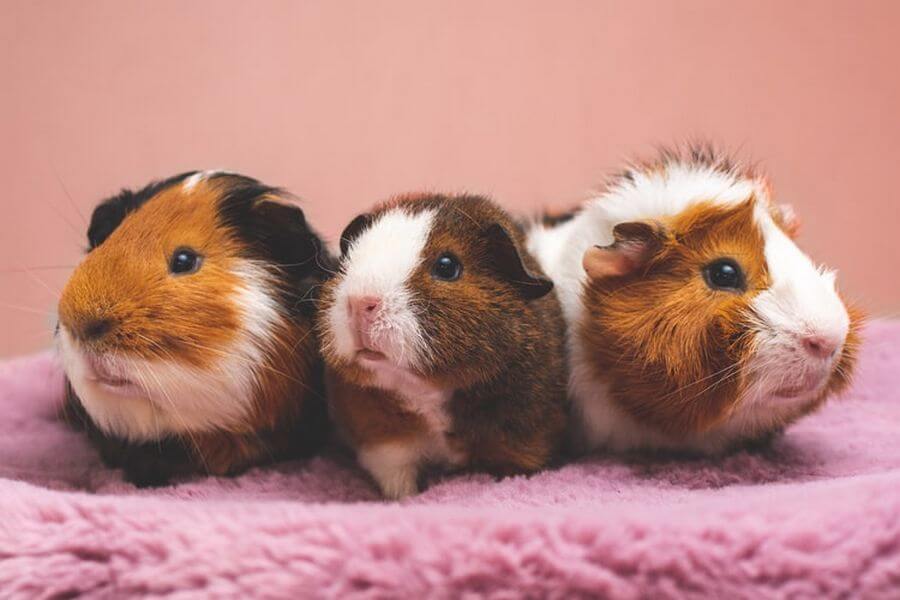Guinea pigs are one of the world’s most interesting rodents that can be kept as pets. They are often confused with hamsters. However, guinea pigs are much larger than hamster species. These fun-loving, adorable rodents are an excellent choice for a pet. They each have their own personality and are much more than just rodents in a cage.
Guinea pigs are great pets to own. They are unique, playful, and loving. They are often misunderstood as being boring or mean. With proper care and attention, guinea pigs can be interesting and exciting pets. They are typically thought of as being good first pets for children with small backyards.
While guinea pigs are good pets, they aren’t really suitable for small children. Of course, this varies based on a child’s responsibility level but overall, guinea pigs do require a bit more care than what people think. Children have short attention spans and most younger children may not have a sense of responsibility yet.
Therefore, guinea pigs are good pets for older children or even adults. They can provide comfort and companionship to their owners. Each guinea pig has its own personality. They are prey animals so they do have the instinct to run and hide. Because of this, it is important to respect their space in order to really gain their trust.
Not all guinea pigs will be like this, some are much better at being handled by humans. However, for the ones who are more shy and scared, the first step to bonding with them is respecting their space as much as possible. This doesn’t mean they can’t be picked up and held.
Rather than picking them up, which should be done with caution and care, sudden movements can scare a shy guinea pig. But over time, this barrier could be eased.
Guinea pigs make good pets because they are super adorable and can be really interactive animals with proper care. In order to really get the benefits of having a guinea pig as a pet, their owners should be willing to learn about bonding with them and providing them with appropriate wooden chews that encourage active engagement.
Additionally, guinea pigs should have floor time to ensure that they get exercise. Both of these things are a great way to enjoy having a guinea pig as a pet!
Are Guinea Pigs High Maintenance?
As expressed, guinea pigs are often thought of as simple creatures that just sit in their cage. This really isn’t true! They show emotions and communicate in various ways. They require a bit more care than simply placing them in their cage and leaving them to their own devices. Guinea pigs could be considered high maintenance.
They are considered high maintenance primarily because piggies depend on their owners to do everything for them. From feeding them fresh veggies, refilling their water and hay, providing pellets and interactive toys there is a lot that guinea pigs depend on their owners for. Below are some ways that guinea pigs are high maintenance!
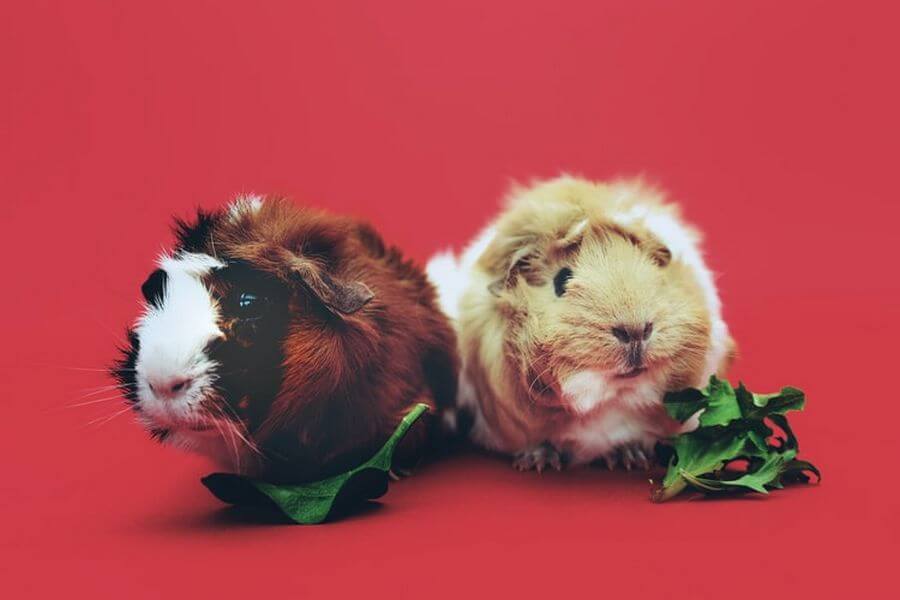
Ways That Guinea Pigs Are High Maintenance
A Guinea Pigs Bedding Needs To Be Changed Once A Week (Or More)
The best bedding option for guinea pigs is paper bedding. There’s some debate in the guinea pig world surrounding what type of bedding is best for piggies. Some people prefer paper bedding while others prefer fleece bedding. Both types of bedding have their perks and their cons.
Ideally, it comes down to how much maintenance someone is willing to put into the type of bedding they choose.
Paper bedding is convenient because it absorbs odour pretty well. An additional way to provide an extra barrier against urine smell is to use puppy training pads under the layers of paper bedding. Paper bedding is easy to clean up and can be disposed of in a regular trash bag.
This type of bedding can be changed out once a week on average. Some spot cleaning should be conducted to ensure that guinea pigs aren’t sitting in any wet bedding.
Fleece bedding is a bit more difficult for some people to maintain. It requires a special washing that makes the fabric wipe away moisture. Spot cleaning must be done daily to avoid feces build-up. Puppy pads should be used under fleece liners to absorb moisture.
This type of bedding choice works for some people but not for everyone. If the bedding becomes too wet, piggies can get foot sores from sitting in the wetness.
Guinea pigs are also prone to respiratory illnesses which can derive from cages that aren’t well kept. Perhaps their cage cleaning is the biggest high maintenance part of their care. While their bedding can be tricky, it shouldn’t deter someone from wanting to have a guinea pig. They are so adorable!
Guinea Pigs Need To Be Fed Fresh Veggies Every Day
Fresh veggies should be an important part of a guinea pig’s diet. They need around a cup of veggies a day. It is important to always check online for veggies that are safe for guinea pigs and for veggies that are not. Almost all lettuce is suitable for guinea pigs like radicchio, romaine, butter, etc. However, iceberg lettuce can lead to diarrhea if fed too frequently as it offers no nutritional value.
Other great veggie choices include green peppers, cucumbers, zucchinis, tomatoes (although not the stems or leaves), and carrots. Carrots are high in sugar and shouldn’t be fed to guinea pigs that often. Lettuce can be fed every day as well as cucumber and zucchini.
It is important to provide a variety of veggies because giving them the same veggies can lead to them not eating. This is because they get bored with the same selection.
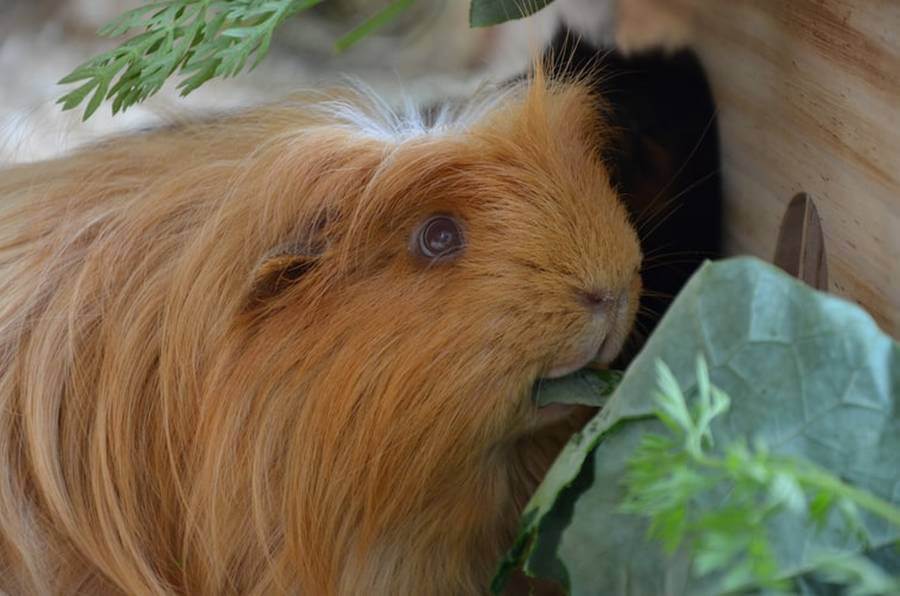
Fruits can be given but only in small amounts. They can be a refreshing treat on a warm day or simply a treat in general. Great fruit choices for guinea pigs include blueberries, mango, kiwi, and grapes. Providing them fruit around once a week is the best approach to keep their sugar intake in check while still giving them plenty of options.
They generally like being fed around the same time every day, so setting a specific time to feed them can help them be happy as well. Setting this time around a personal schedule is the easiest way to implement it.
For example, feeding them their cup of veggies in the morning or in the evening at a regular time is helpful. While it is easier to split the cup up to half a cup per feeding, twice daily, it can be acceptable to do it once daily depending on someone’s personal schedule.
Guinea Pigs Need Access To Hay
Hay is an important thing for guinea pigs. It not only adds to their overall diet but helps keep their teeth ground down. Guinea pig’s teeth constantly grow and hay is an excellent way to maintain their teeth from overgrowing. They should have a constant supply of hay available so that they can keep their teeth naturally trimmed.
Overgrown teeth can be quite troublesome for guinea pigs. If a piggie’s teeth become overgrown, they may stop eating or eat significantly less. This is because there’s discomfort from the overgrown teeth that prevent them from eating in a normal manner. This is why giving them fresh hay throughout the day is such an important thing to remember.
Guinea Pigs Should Have Wooden Chew Toys
Just as they access hay to maintain their teeth, guinea pigs should have access to wooden chew toys. Pet stores have a selection of wooden toys that are appropriate for guinea pigs. They often include twine balls, wooden blocks, blocks with treats inside, or even come in fun shapes.
Additionally, these toys typically have guinea pig safe materials on them to encourage piggies to chew on the item.
Giving guinea pigs wooden chew toys also keeps them engaged. Their cage environments can become quite boring if there’s nothing for them to interact with. This is why they should have ample space to run and play as well as things to chew.
Perhaps the imagery of guinea pigs sitting in the corner of their cage is derived from a piggie that didn’t have enough to interact with.
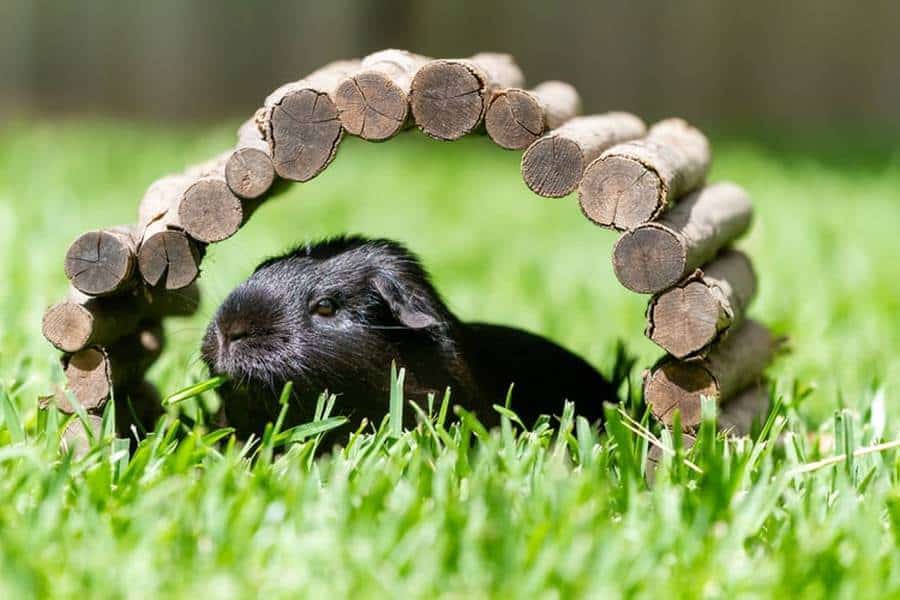
Guinea Pigs Require Regular Vet Checks
Vet checkups aren’t just for cats and dogs. There are vets who specifically see animals like guinea pigs. These vets are often referred to as exotic pet vets. They are knowledgeable about creatures like rodents, rabbits, reptiles, etc.
Taking a guinea pig for a yearly vet checkup ensures that they are being monitored throughout their life cycle. As they age, health problems can arise so providing these life-long vet checks helps them a great deal.
Exotic vets will check for things like strange breathing, abnormal heartbeats, tooth obstructions, mites, paw quality, eye cloudiness, etc. These checkups aren’t as expensive as cat or dog visits but the price really isn’t a concern as the health of the pet should always be considered. If need be, the vet can prescribe medication or provide suggestions for care.
A Guinea Pigs Nails Should Be Trimmed Once A Month
Just like their teeth, guinea pig nails constantly grow. They should be trimmed monthly with special nail clippers. Some guinea pig owners aren’t comfortable doing this because cutting the nail too short can result in bleeding.
Exotic vets will clip a piggie’s nails for those too scared to do so. However, tackling this task isn’t too difficult for those brave enough to try it.
Using the special nail clippers and bright light, trimming guinea pig nails can be accomplished. The bright light provides ample lighting so that the red vein in the nail can be seen. This is what causes bleeding if the nail is trimmed too short.
The best way to approach getting used to trim a guinea pig’s nails is to only take off a little bit of the nail at a time. Once this has been done repeatedly, it will get easier to know where the red vein is located and trimmings can go by a lot quicker.
Some piggies will handle the clipping just fine. Others will be more resistant. It is important to keep them still so no accidents happen. Some people find placing them in a towel keeps them calmer. It really just depends on the guinea pig and their tolerance of being handled.
Keeping a firm and steady hand is important. If a guinea pig is too squirmy, the only option might be to have the vet clip the nails.
It is important to trim the nails every month or every other month at the latest. They continuously grow like their teeth and can curl under their feet. This is a serious issue because the nails can become embedded into the footpads of the paw. This is in super extreme cases.
If a guinea pig owner forgets to get it done or do it themselves for a couple of months it isn’t a huge issue. However, attempting to maintain a regular nail clipping schedule helps keep them shorter and the piggie healthier.
A Guinea Pig Requires Access To Vitamin C
Guinea pigs are unable to produce their own vitamin c. It is critical that their owners provide vitamin c as a supplement to their diets. The easiest way to do this is through special vitamin c enhanced hay chews. These chews aid in keeping their teeth healthy as well as provide them with vitamin c.
Another method of administering vitamin c is through a plunger syringe in liquid form. This method isn’t easy for all guinea pig owners as most guinea pigs do not take the syringes well.
It is important to keep them steady while doing this method and one hand should be used to ease their mouth open while the other hand carefully places the plunger syringe in the corner of the mouth behind the teeth. The liquid should be slowly dispensed.
The syringe method is better accomplished if there’s a second person to help. Either method is suitable but tablets are the easiest way.
Some guinea pig owners would argue that giving them a diet with veggies that have high vitamin c content is good enough. However, it isn’t. Veggies alone can’t provide enough vitamin c. Using either the tablet or liquid is truly ideal.
Guinea Pigs May Need A Little Extra Help As They Get Older
Guinea pigs start to slow down after a certain age. As they get older, they may need help in some of their day-to-day activities. This is particularly true for male guinea pigs. Male guinea pigs are known for getting fecal impactions. This is where the fecal matter builds up in their behinds and may not come out in a regular fashion. The regular pellets of feces become balled up.
It might be disgusting, but in these cases, they need a little extra help. A vet can show owners how to assist in getting this out. It isn’t pleasant but necessary. Another way that senior guinea pigs might need help is with their food. They might need their veggies cut a little smaller. Additionally, they might need extra vitamin c.
These reasons make guinea pigs a bit high maintenance. They require a lot more care and attention than some would think. While they don’t need around-the-clock attention, they do still need quite a bit of daily attention.
They certainly aren’t like dogs which require regular walking schedules. But overall, guinea pigs can be easy to care for once a routine is established with their specific care.
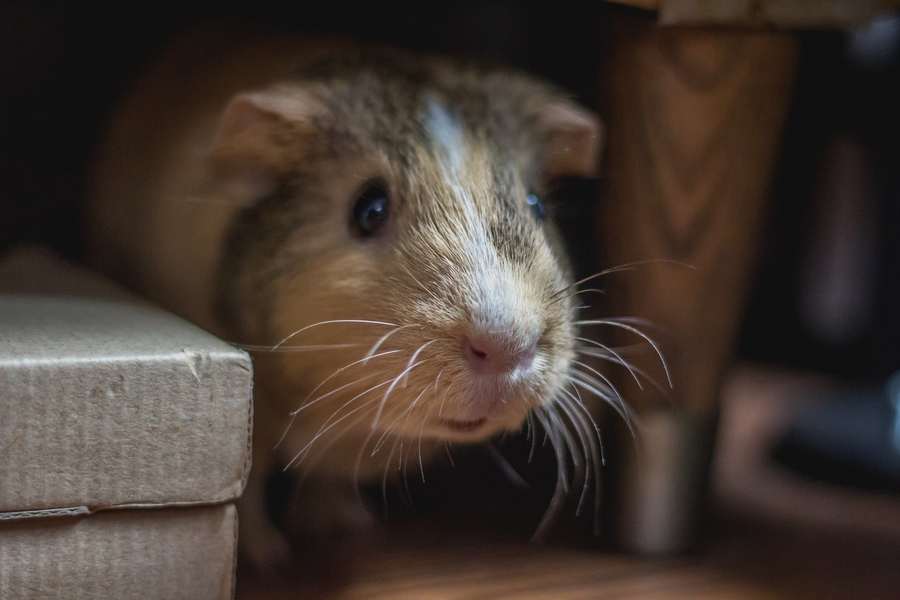
What Are The Pros And Cons Of Having A Guinea Pig?
All animals have pros and cons to owning them, even cats and dogs. Guinea pigs have their fair share of pros and cons as well. Below are the key pros and cons to having a guinea pig as a pet!
Pros Of Having A Guinea Pig
They make adorable sounds like chuttering and wheeking when they happy!
They are known to “popcorn” which is a cute dance they do when they are excited. They jump in the air much like a kernel of popcorn popping.
They are known for being cuddly. Provided that a guinea pig isn’t too shy, they can be cuddly and enjoy plenty of pets!
They get excited to see their owners! Even though their excitement is probably because they think they are getting food, it is still nice to see them getting pumped up about seeing their owners!
They are generally easy to care for so long as a regular routine is kept.
They are sociable animals. They are best kept in pairs of two so that they can socialize. However, they enjoy being around familiar surroundings such as their owners as well. Since they are prey animals, they find comfort in things they know.
Cons Of Having A Guinea Pig
They are fragile animals. From their fragile bones to their delicate respiratory systems, they are heavily influenced by their surroundings. These surroundings can cause health issues.
They as susceptible to health issues, especially as they get older. This includes respiratory illnesses, teeth issues, loss of muscle mass, etc. This is why regular vet checkups are so critical for guinea pigs.
They have a short life span. Guinea pigs only have a life expectancy of 6 to 8 years. Some live shorter lives and some live longer lives. Ensuring they get the best care throughout their lives, which is critical to extending their life expectancy as much as possible.
There’s always poop! Guinea pigs poop a lot. Their feces are small pellet shapes and because they eat hay a lot, as well as their veggies and/or pellets, they have many poops. The good news is that the poops are easy to clean up!
Guinea pigs are a great pet to enrich someone’s life. They aren’t the same as having a cat or dog, but their unique care and personalities make them quite exceptional pets!
More Pages On Guinea Pigs
Guinea pigs are one of the world's most unique and adorable rodent pets. These creatures have such large personalities and are often misunderstood. Having a guinea pig as a pet comes with...
Getting a guinea pig for a pet is such an exciting experience! These adorable rodents are quirky pets that are really fun to engage with. Guinea pigs have a reputation of being boring, however, this...


